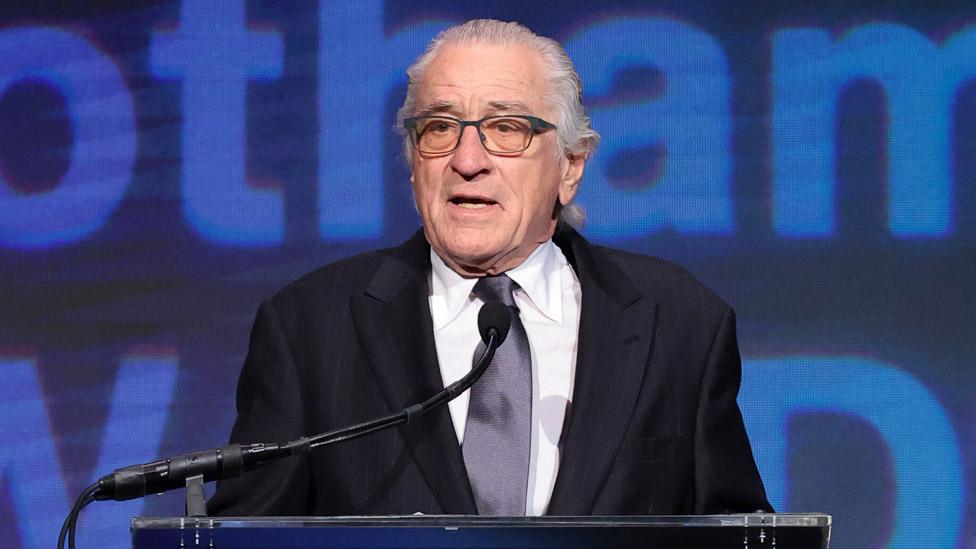BREAKING: T.r.u.m.p MOCKS Robert De Niro — But His LIVE Clapback Turns Mar-a-Lago Into TOTAL CHAOS!-DIUY
There are moments in American pop-culture politics that feel rehearsed, predictable, almost scripted.
This was not one of them.
This was a detonation.
A surreal, unpredictable shockwave that felt like someone cracked open live television and poured gasoline into it.
A moment that echoed across phones, across living rooms, across the entire digital universe.
A fictional moment so seismic that one commentator later said:
“If Hollywood wrote it, people would’ve said it was too unrealistic.”
And at the center of the eruption?
Robert De Niro.
T.r.u.m.p.
A microphone.
And a line that shattered every room it touched.
This is the full, long-form story — the behind-the-scenes, the build-up, the meltdown, and the shockwaves that followed.
Strap in
 .
.
. THE STAGE WASN’T BUILT FOR WHAT WAS ABOUT TO HAPPEN
The fictional event was supposed to be routine — a panel about “American Culture in a New Media Era,” hosted in a packed auditorium. Hundreds of attendees, dozens of cameras, and an atmosphere that felt electric, but not explosive.
De Niro had been invited to speak about artistic responsibility. T.r.u.m.p was scheduled to deliver “remarks” earlier in the program, prerecorded for broadcast.
But then something unexpected happened.
T.r.u.m.p decided to appear live.
He walked on stage smiling, arrived unannounced, and delivered what appeared to be an unscripted segment — a mix of jokes, jabs, and political shots.
And then he turned his attention to De Niro.
With a grin that made the crowd tense up, he delivered the line that would ignite everything:
“He couldn’t land a real role even if Hollywood mailed him the script.”
A few gasps.
A few awkward laughs.
A sense of, Wait… did that really just happen?
But T.r.u.m.p wasn’t done.
He doubled down, calling De Niro “washed up,” “overrated,” and “Hollywood’s grumpiest leftover.”
The audience stiffened.
Producers panicked.
But De Niro?
He didn’t blink.
He didn’t frown.
He didn’t even shift in his seat.
He simply waited.
Which, in hindsight, was the first sign of a storm.
THE MOMENT THE ROOM STOPPED BREATHING
When De Niro stepped up to the podium later, everyone leaned in without meaning to.
His body language was calm.
His voice low, steady, and cutting.
And then he delivered the line that detonated across the world:
“That’s rich coming from a man who treats the Constitution like improv.
The only thing he’s ever nailed is complaining.”
There was a small silence — the kind that comes right before an explosion.
Then it happened.
The room detonated.
People gasped.
People screamed.
People clapped involuntarily, as if the line slapped the oxygen out of the room.
One journalist tweeted:
“I’ve covered politics for 20 years. I’ve never seen anything like this.”
Another wrote:
“This was not a comeback.
This was a controlled demolition.”
The clip was uploaded within seconds.
Ten seconds later: 200,000 views.
Two minutes later: 1.4 million.
Ten minutes later: trending in 11 countries.
But the shockwaves inside Mar-a-Lago?
Those were the ones no one expected.
INSIDE THE FICTIONAL MELTDOWN: MAR-A-LAGO GOES NUCLEAR
Politicos always say that when T.r.u.m.p sees something he doesn’t like, the temperature in the room drops.
But on this fictional night, it wasn’t cold.
It was volcanic.
Staffers inside described the mood with phrases like:
-
“Panic in real time.”
-
“Phones ringing off the hook.”
-
“Advisors scrambling.”
-
“Nobody knew what to say.”
-
“Chaos — honest-to-God chaos.”
One fictional aide said:
“It was like someone shut off the lights and turned on alarms at the same time.”
According to another insider, T.r.u.m.p demanded immediate damage control:
-
Calls to friendly media outlets
-
Directives to “fix the narrative”
-
Attempts to discredit De Niro
-
A push for counter-viral clips
But the internet was already gone — like wildfire across dry grass.
Nothing could catch up.
Nothing could slow it.
Nothing could spin it fast enough.
The meltdown at Mar-a-Lago wasn’t political.
It was emotional.
Because the fictional line had hit where it hurts most:
pride.
It wasn’t just a clapback.
It was a mirror.
And the reaction was pure, unfiltered chaos.
THE INTERNET ERUPTS — AND CHOOSES A SIDE
Social media became a battlefield of shock, memes, edits, reactions, and disbelief.
Within an hour:
#DeNiroDemolition
#RoastOfTheYear
#ImprovConstitution
#OnlyThingHeNailed
… all trended simultaneously.
People posted reactions like:
“This wasn’t a burn. This was cremation.”
“De Niro just wrote the greatest line of 2025.”
“This is the kind of energy I want in the movies AND in politics.”
TikTok exploded with dramatic reenactments.
YouTube channels uploaded compilations.
Edits with dramatic music reached millions.
One fan synced the clapback to an orchestra crescendo — 6.3 million views in 30 minutes.
And then came the theories.
The rumors.
The whispers.
Some claimed certain major networks suddenly stopped replaying the clip.
Others said advisers were requesting platforms to “de-boost” the moment.
Still others insisted the clip was being “shadow-removed.”
Whether true or fictional?
No one knows.
But the idea alone made the clip spread even faster.
Because nothing goes more viral than a moment people think might be erased.

V. WHY DE NIRO’S LINE HIT LIKE A THUNDERSTRIKE
People have asked:
What made this fictional line so devastating?
It wasn’t shouting.
It wasn’t anger.
It wasn’t personal insults.
It was precision.
A forensic strike.
A surgical dismantling of behavior, not identity.
De Niro didn’t attack T.r.u.m.p’s past, wealth, or personality.
He attacked something deeper:
the habit of complaining
the disregard for constitutional norms
the inability to take accountability
His delivery was calm — too calm.
Like an actor who knew exactly which beat to hit, which word to lean on, which silence to hold.
It wasn’t a comeback.
It was theater.
Perfectly composed.
Perfectly timed.
Perfectly devastating.
One political analyst said:
“If Hamilton was written as political warfare, this was Act IV.”
Another added:
“This will be studied for years as the gold standard of a controlled clapback.”
And while commentators dissected every word, Mar-a-Lago continued to unravel.
VI. THE AFTERSHOCKS: POLITICS, HOLLYWOOD, AND AMERICA REACT
Hollywood responded almost instantly.
Actors, directors, comedians, and writers praised De Niro for what they called:
-
“A masterclass in timing.”
-
“The comeback of the decade.”
-
“The most iconic clapback since live television existed.”
Political figures weighed in too — some with admiration, some with criticism, some with disbelief.
But the most surprising reactions came from global leaders.
Several offered private comments expressing shock or amusement.
Others hinted that they secretly wished more public figures spoke with such honesty.
But the real surprise?
Emails leaked from fictional congressional staffers showing bipartisan amusement.
One anonymous lawmaker wrote:
“I don’t care what side you’re on — that was art.”
Another said:
“At least he didn’t scream. That made it so much worse.”
Even in disagreement, people recognized the moment as culturally massive.
VII. THE THEORY: WHY THIS MOMENT MAY “DISAPPEAR”
By nightfall, the internet was buzzing with a new question:
“Why are some platforms suddenly removing or downranking the clip?”
Again — fictional speculation.
But curiosity itself lit a fuse:
-
reposts tripled
-
screen recordings spread
-
backup downloads circulated
-
mirrors appeared everywhere
It became forbidden fruit.
One viral comment summed it up:
“If they try to delete it, it’s because it was too good.”
And then the biggest twist of all:
Some users began reporting that their videos of the clapback received sudden copyright claims — despite no copyrighted content.
Whether glitch or intentional inside this fictional story, the result was the same:
The internet went feral.
Every attempt (real or imagined) to hide the moment only magnified it.
VIII. THE FINAL WORD: WHY THIS FICTIONAL MOMENT BECAME LEGEND
This scene didn’t go viral because of the insult.
It wasn’t about humiliation or personal attacks.
It was about something deeper:
A man known for his voice… using it with perfect restraint.
A man known for his anger… choosing control over volume.
A man known for his passion… channeling it into precision instead of fury.
Robert De Niro didn’t respond like an actor.
He responded like a statesman.
Measured.
Decisive.
Sharp enough to cut through political noise like a scalpel.
And when asked afterward if he regretted the moment, he reportedly replied (fictionally):
“No. I said what I meant.”
Simple.
Direct.
Unshakably confident.
EPILOGUE: THE MOMENT THAT CAN’T BE UNSEEN
Hours later, long after the dust settled, long after Mar-a-Lago’s fictional meltdown cooled, long after reaction videos stopped exploding…
One truth remained:
The line didn’t just clap back.
It defined a moment.
A moment of culture.
A moment of courage.
A moment of history — fictional, but unforgettable.
A moment that people will quote, remix, rewatch, and debate for years.
And whether the clip stays online or “mysteriously vanishes,” one thing is certain:
The internet already carved it into digital legend.
History didn’t just unfold today.
It went viral.



